[ad_1]
Which vice brings in more in taxes — weed or alcohol?
It depends on the state, the local trend and the taxes set up on each. But with marijuana becoming legal, it comes as no surprise that Montana is projecting tax revenue from cannabis to go up, while wine and beer should remain at the same level, over the next couple of years.
New revenue projections from Governor Greg Gianforte’s budget proposal show that taxes on alcohol should slightly go up, while income from taxes on tobacco is expected to go down, reported Daily Montana.
See Also: Louisiana Medical Board On Marijuana Recommendations
Cannabis is projected to make hefty contributions to state coffers, though still accounting for a small part of the total general fund collection.
“Total stimulus spending directed to Montana individuals, businesses, and government entities amounted to $11.8 billion,” the budget proposal said.
Tax revenue from pot sales is forecasted to reach $50.7 million in the 2024 fiscal year, and $57.7 million in 2025 for the general fund, as per the new budget proposal.
In 2023, the first full year of adult-use cannabis program implementation in the Treasure State, $30.7 million in tax revenue is expected. The budget proposal also projects for the gross revenue on marijuana to hit $61.1 million in 2023 and $91.9 in 2025.
Revenue From Liquor Taxes
For comparison, general fund revenue from liquor taxes is estimated to reach $32.6 million in the 2025 fiscal year, which is slightly above $30.1 million in 2023.
Interestingly, the number of alcohol bottles sold increased by 3.7% a year on average from 2016 to 2019, and then, thanks to the Covid pandemic liquor sales skyrocketed. In 2020, 2021, and 2021 the same sales went up 16.9%, 20.7%, and 10.6%, respectively. They are now back to the previous pace.
When it comes to tobacco, the budget proposal estimates the total revenue from taxes to reach $35.5 million in 2025, up from $36.3 million in 2023.
“I anticipate that the tax revenue will increase a little year over year and level out after about ‘25, ‘26,” Pepper Petersen, president and CEO of the Montana Cannabis Guild, said.
A 25% total tax on recreational cannabis in a state is “ludicrously high,” he added. “On any other item, people would burn the Capitol down… Montanans hate sales taxes.”
He believes that cannabis taxes will decline in the future, adding he would very much appreciate the 4% tax for medical marijuana removed.
“Obviously, hard alcohol is much more corrosive to society than what marijuana is,” Petersen said.
Cannabis Developments In Montana
In 2020, Montana officially became the 14th state to legalize adult-use cannabis.
About 58% of voters said yes to the initiative during the November election. The initiative legalized the possession and use of one ounce or less of cannabis or eight grams or less of marijuana concentrate by adults over the age of 21.
In addition, retail marijuana sales for adults 21 and older started in Montana on Jan. 1, 2021.
Until September 2022, dispensary operators in Montana, a state that is home to about 1.1 million residents, have sold more than $201 million worth of cannabis ($133 million from adult-use sales). Those sales have provided the state with nearly $29.3 million in tax revenue.
Photo: Benzinga Edit; Sources: Giorgio Trovato and Budding and Oscar Nord on Unsplash.
[ad_2]
Image and article originally from www.benzinga.com. Read the original article here.

